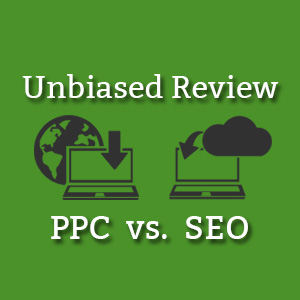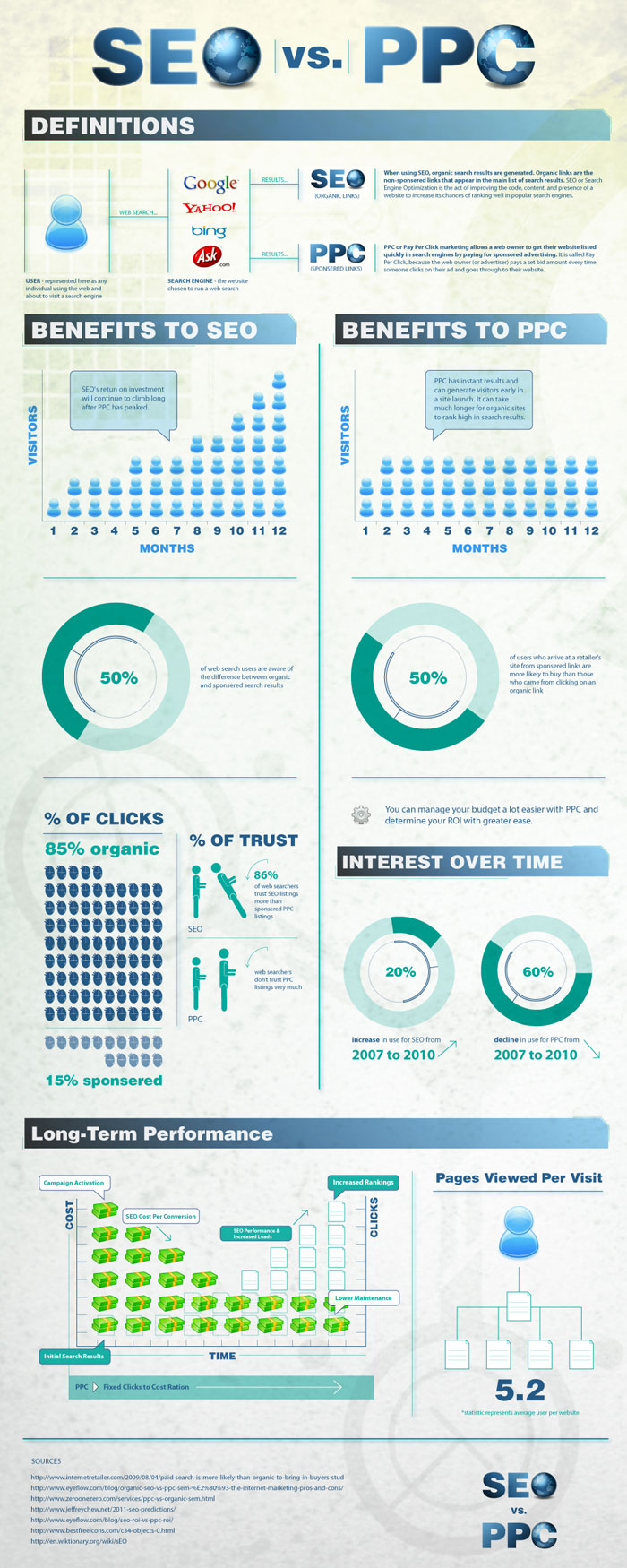 The world of search is in constant flux, and the debate of PPC vs. Organic Search Engine Optimization is raging on as intensely as ever.
The world of search is in constant flux, and the debate of PPC vs. Organic Search Engine Optimization is raging on as intensely as ever.
SEO Agencies point to the 60% decrease in PPC use in just 4 years, while PPC advocates point to the immediate impact and quick wins with paid search.
While both PPC and SEO have merit, the rise in user’s search engine savviness seems to be swinging the pendulum in favor of organic search engine optimization.
PPC vs. Organic Search Engine Optimization: Pros
Pay-Per-Click (PPC) Search Pros:
- Rapid results – start getting visitors within hours.
- Only pay for the traffic you receive.
- Specific geographical targeting – focus your advertising efforts on pinpointed regions. This is especially helpful for local businesses.
- Easily change settings – it’s not hard to split test and quickly adapt your strategy with PPC.
- Choose from more words – unlike organic search engine optimization, PPC allows you to target words without incorporating them into your website copy.
Organic Search Engine Optimization (SEO) Pros:
- More credibility in users eyes than PPC results.
- Organic SEO work builds upon itself – ranking for your first keyword makes ranking for the second keyword a little easier, etc.
- The same SEO principles help you rank in all search engines – not just Google and Bing, but possibly even in engines that don’t yet exist.
- Over time, SEO is typically more cost effective than PPC.
- The same work that boosts your SEO rank will also improve your website for your audience, allowing you to achieve multiple goals simultaneously.
- SEO visitors tend to be more engaged and return more often than PPC traffic.
Pay-Per-Click (PPC) Search Cons:
- You pay for every single click – qualified or not. Those competitors clicking on your links are costing you money!
- Stopping your campaign – when your budget runs out, your traffic goes with it, there’s no residual effect or built-up authority.
- Management and analysis are critical to get the best return, but can be time-consuming and overwhelming.
- 86% of users trust organic results more than PPC results – garnering those clicks can be a challenge.
Organic Search Engine Optimization (SEO) Cons:
- Takes longer to show up in search results.
- No guarantee of ranking – you might never get to the coveted first page.
- Requires changes to your website and content creation.
- Changing algorithms – some factors in SEO rankings are changing or unknown.
PPC vs. SEO – What’s Best For You?
Every site has unique needs, but these guidelines may help you make the decision between PPC, SEO, or adopting an integrated approach.
Organic SEO may be best for you if you’re interested in long-term results, have the patience to achieve consistent results, want to work on improving your user’s experience and add helpful content, or if you want to maximize your traffic for the lowest cost.
The greatest benefit from organic SEO vs. PPC may be the dual-benefits of the work you do. Not only do your search engine results improve from writing new, authoritative, helpful content, visitors also get the in-depth, educational resources that they want!
PPC may be best for you if your site is new and you want to start ranking immediately, you’re in a very competitive niche, you built your site on a SEO-unfriendly platform and you’re unwilling to switch, you have a large advertising budget and just need to maximize traffic, you want to test keywords and landing pages quickly, or if you have a reason to turn traffic on and off quickly.
PPC vs. Organic Search Engine Optimization: Infographic
Infographic Credit: originally posted on Unbounce.com.
Whether you choose PPC, SEO, or a blend of the two, they both should fit into your overall inbound marketing strategy. Develop that strategy with this free eBook, Inbound Marketing 101.

